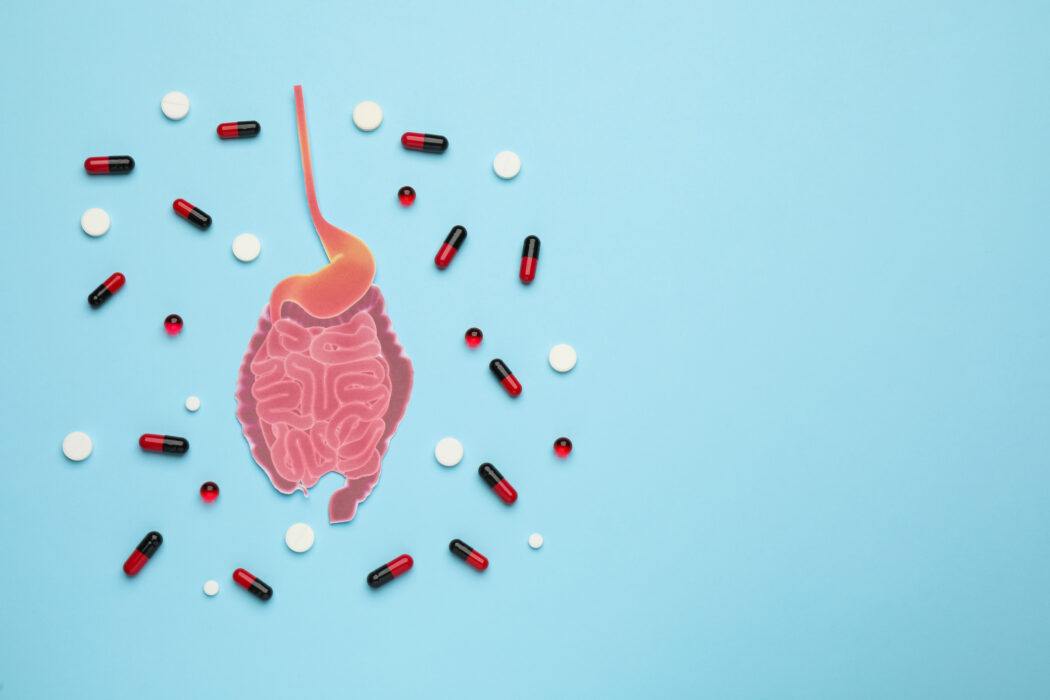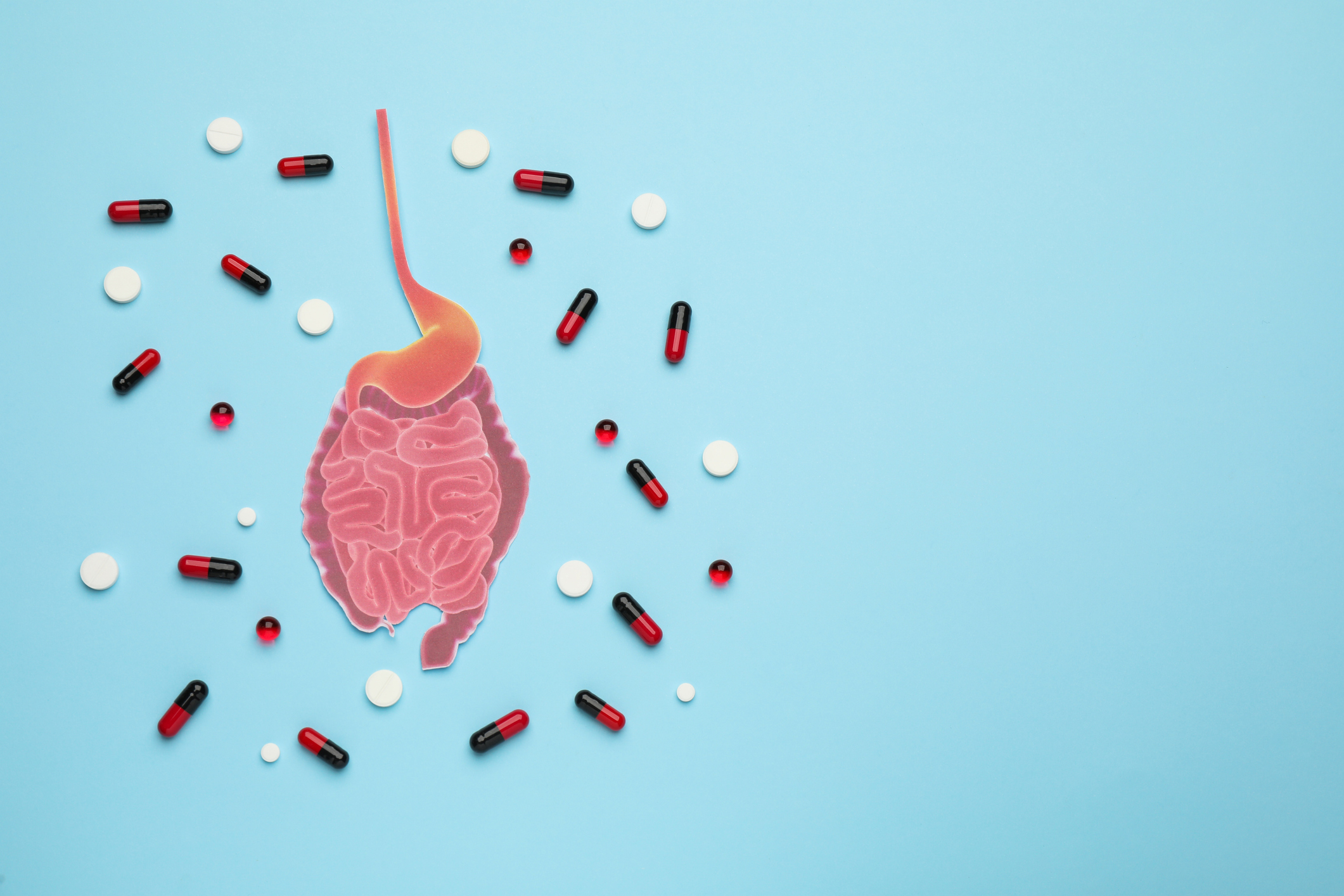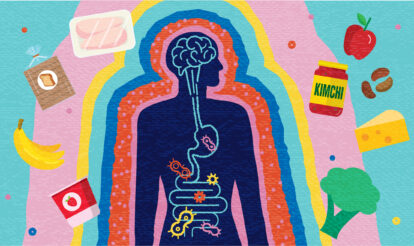
How antibiotics affect gut health – and how to recover
How antibiotics affect gut health – and how to recover

Antibiotics have saved countless lives since their introduction to modern medicine in the early 20th century. But while necessary in certain cases, antibiotic use – especially over-use – can have a downside.
As antibiotics cannot differentiate between beneficial and pathogenic bacteria, they can negatively impact the gut microbiome, potentially leading to short-term effects such as antibiotic-associated diarrhoea (AAD), dysbiosis (an imbalance of beneficial bacteria) and increased susceptibility to pathogen colonisation.[1]
Even short courses of antibiotics can quickly alter the composition of the gut microbiome, reducing beneficial species and allowing potentially harmful ones to flourish.[2] Recurrent antibiotic use has been associated with bacterial resistance, and may result in infections that are more difficult to treat and pose further complications.[3]
The gut microbiome is central to nearly every bodily function, and restoring its health, resilience, and diversity is strongly recommended by most health professionals during or after a course of antibiotics.
Studies suggest that the most effective way to do this is through diet and probiotics.
What do antibiotics do to the gut?
Antibiotics kill or inhibit harmful bacteria by targeting essential parts of the bacterial cell structure or functions.[4] While necessary for treating certain bacterial infections, these mechanisms may also affect the beneficial species that reside in the gut and colon.
Without post-treatment intervention, antibiotics may:
- Reduce microbial diversity, including beneficial species such as Bifidobacteria and strains that produce important short-chain fatty acids.[5] Some probiotic species may remain depleted for several months.
- Increase the risk of antibiotic-associated diarrhea (in 5-25% of patients), post-antibiotic infectious overgrowth such as Clostridium difficile; bloating, constipation, dysbiosis, gut inflammation, and damage to the intestinal lining.[6]
- Increase the risk of gastrointestinal infections, yeast infections, inflammatory bowel disease (IBD), weight gain and obesity, and increased cholesterol levels.[7],[8],[9]
- Potentially increase risk of childhood asthma, eczema, allergies, and respiratory illnesses.[10]
- Promote the development of resistant bacterial strains, which may persist long after treatment ends.[11]
How to support gut recovery after antibiotics
Diet
-
Fibre
Fibre, especially prebiotic fibre, helps feed beneficial bacteria in the gut. This stimulates their growth and supports the production of short-chain fatty acids, which play a key role in gut health and immune system function.[12] Fibre also assists the movement of food through the intestine.[13]
Prebiotics such as cellulose, pectin, inulin, and beta-glucan have been shown to reduce the impact of antibiotic treatment on microbiome composition and function, helping to protect and restore beneficial bacteria during antibiotic treatment.[14]
A 2025 study found that people eating a high-fibre diet after antibiotic treatment experienced better recovery of gut microbiome than those eating a standard Western-style diet.[15] A high-fat, low-fibre diet after antibiotics was also more likely to lead to dysbiosis and subsequent infections.[16] - Good sources of prebiotics include asparagus, garlic, chicory, onion, Jerusalem artichoke, wheat, barley, rye, soybean, peas, beans, and green bananas.[17]
-
Fermented foods
Fermented foods are created when beneficial yeast or bacteria break down certain sugars and proteins. These foods provide live microbes and nutrients that may support gut function and microbial diversity.[18]
A 2021 study from Stanford University found that fermented foods significantly increased gut microbiota diversity and reduced markers of inflammation. These changes occurred without major changes to diet, suggesting that fermented foods may be a powerful means of improving gut microbiome and immune function.[19] - Good sources of fermented foods include yoghurt, kimchi, kefir, sauerkraut, miso, kombucha, and tempeh.
Supplements
-
Probiotics
Probiotics are live bacteria that can help to support and restore gut flora during and after antibiotic use.
A 2021 systematic review found that probiotic supplementation alongside antibiotics reduced the risk of AAD in adults by 37%. The most effective species included acidophilus, L. bulgaricus, L. casei, L. paracasei, L. rhamnosus, B. animalis ssp Lactis, B. longum, and B. subtilis.[20] The beneficial yeast Saccharomyces boulardii is shown to reduce antibiotic-associated diarrhoea and is resistant to most antibiotics.[21]
A 2022 meta-analysis concluded that taking probiotics alongside antibiotics may prevent many of the disruptions to gut microbial diversity and composition caused by antibiotics, as well as restoring beneficial species.[22]
A 2024 study found that patients supplementing with a probiotic alongside their antibiotic not only maintained microbial diversity but had significantly fewer antibiotic resistance genes (ARGs) in the re-growth population than those taking placebo.[23] - Look for a multi-strain probiotic supplement product made with acid-stable technology (to protect the bacterial contents during passage through the gut) and is recommended as suitable to take alongside antibiotics. Probiotics should be taken at least two hours apart from antibiotics for best effect.
-
Omega-3 fatty acids
Omega-3 supplementation may also assist in restoring gut health following antibiotic treatment.
Accumulating evidence suggests that omega-3 intake can reverse gut microbial dysbiosis by increasing beneficial probiotic species (including Lactobacillus and Bifidobacterium) and SCFA-producing bacteria.[24]
Omega-3 also helps to reduce intestinal inflammation and promote the restoration of the gut lining by increasing production of anti-inflammatory compounds.[25]
- Good sources of omega-3 include fatty fish (salmon, mackerel, sardines, tuna) and algae. Supplements made with purified fish oil and high-potency EPA+DHA provide a concentrated daily dose.
The time it takes to restore the gut microbiome after antibiotics may be different for everyone depending on individual circumstances. However, intervention with a high-fibre diet and probiotics may help to mitigate the effects of antibiotics and support recovery.[26]
This information is provided for educational purposes only and is not a substitute for professional medical advice. Always seek the guidance of your physician or qualified healthcare provider with any questions you may have regarding your health or a medical condition.
References
[1] Muteeb, G., Rehman, M. T., Shahwan, M., & Aatif, M. (2023). Origin of Antibiotics and Antibiotic Resistance, and Their Impacts on Drug Development: A Narrative Review. Pharmaceuticals (Basel, Switzerland), 16(11), 1615. https://doi.org/10.3390/ph16111615
[2] Zimmermann, P., & Curtis, N. (2019). The effect of antibiotics on the composition of the intestinal microbiota – a systematic review. The Journal of infection, 79(6), 471–489. https://doi.org/10.1016/j.jinf.2019.10.008
[3] Aslam, B., Wang, W., Arshad, M. I., Khurshid, M., Muzammil, S., Rasool, M. H., Nisar, M. A., Alvi, R. F., Aslam, M. A., Qamar, M. U., Salamat, M. K. F., & Baloch, Z. (2018). Antibiotic resistance: a rundown of a global crisis. Infection and drug resistance, 11, 1645–1658. https://doi.org/10.2147/IDR.S173867
[4] Halawa, E. M., Fadel, M., Al-Rabia, M. W., Behairy, A., Nouh, N. A., Abdo, M., Olga, R., Fericean, L., Atwa, A. M., El-Nablaway, M., & Abdeen, A. (2024). Antibiotic action and resistance: updated review of mechanisms, spread, influencing factors, and alternative approaches for combating resistance. Frontiers in pharmacology, 14, 1305294. https://doi.org/10.3389/fphar.2023.1305294
[5] Palleja, A., Mikkelsen, K. H., Forslund, S. K., Kashani, A., Allin, K. H., Nielsen, T., Hansen, T. H., Liang, S., Feng, Q., Zhang, C., Pyl, P. T., Coelho, L. P., Yang, H., Wang, J., Typas, A., Nielsen, M. F., Nielsen, H. B., Bork, P., Wang, J., Vilsbøll, T., … Pedersen, O. (2018). Recovery of gut microbiota of healthy adults following antibiotic exposure. Nature microbiology, 3(11), 1255–1265. https://doi.org/10.1038/s41564-018-0257-9
[6] Motamedi, H., Fathollahi, M., Abiri, R., Kadivarian, S., Rostamian, M., & Alvandi, A. (2021). A worldwide systematic review and meta-analysis of bacteria related to antibiotic-associated diarrhea in hospitalized patients. PloS one, 16(12), e0260667. https://doi.org/10.1371/journal.pone.0260667
[7] Cho, I., Yamanishi, S., Cox, L., Methé, B. A., Zavadil, J., Li, K., Gao, Z., Mahana, D., Raju, K., Teitler, I., Li, H., Alekseyenko, A. V., & Blaser, M. J. (2012). Antibiotics in early life alter the murine colonic microbiome and adiposity. Nature, 488(7413), 621–626. https://doi.org/10.1038/nature11400
[8] Kappel, B. A., De Angelis, L., Puetz, A., Ballanti, M., Menghini, R., Marx, N., & Federici, M. (2023). Antibiotic-induced gut microbiota depletion exacerbates host hypercholesterolemia. Pharmacological research, 187, 106570. https://doi.org/10.1016/j.phrs.2022.106570
[9] R AN, Rafiq NB. Candidiasis. [Updated 2023 May 29]. In: StatPearls [Internet]. Treasure Island (FL): StatPearls Publishing; 2025 Jan-. Available from: https://www.ncbi.nlm.nih.gov/books/NBK560624/ /
[10] Foliaki, S., Pearce, N., Björkstén, B., Mallol, J., Montefort, S., von Mutius, E., & International Study of Asthma and Allergies in Childhood Phase III Study Group (2009). Antibiotic use in infancy and symptoms of asthma, rhinoconjunctivitis, and eczema in children 6 and 7 years old: International Study of Asthma and Allergies in Childhood Phase III. The Journal of allergy and clinical immunology, 124(5), 982–989. https://doi.org/10.1016/j.jaci.2009.08.017
[11] Habboush Y, Guzman N. Antibiotic Resistance. [Updated 2023 Jun 20]. In: StatPearls [Internet]. Treasure Island (FL): StatPearls Publishing; 2025 Jan-. Available from: https://www.ncbi.nlm.nih.gov/books/NBK513277/
[12] Markowiak, P., & Śliżewska, K. (2017). Effects of Probiotics, Prebiotics, and Synbiotics on Human Health. Nutrients, 9(9), 1021. https://doi.org/10.3390/nu9091021
[13] Fu, J., Zheng, Y., Gao, Y., & Xu, W. (2022). Dietary Fiber Intake and Gut Microbiota in Human Health. Microorganisms, 10(12), 2507. https://doi.org/10.3390/microorganisms10122507
[14] Penumutchu, S., Korry, B. J., Hewlett, K., & Belenky, P. (2023). Fiber supplementation protects from antibiotic-induced gut microbiome dysbiosis by modulating gut redox potential. Nature communications, 14(1), 5161. https://doi.org/10.1038/s41467-023-40553-x
[15] Hindson, J. (2025). Post-antibiotics microbiome restoration driven by diet. Nature Reviews Gastroenterology & Hepatology. https://doi.org/10.1038/s41575-025-01090-8
[16] Kennedy, M. S., Freiburger, A., Cooper, M., Beilsmith, K., St George, M. L., Kalski, M., Cham, C., Guzzetta, A., Ng, S. C., Chan, F. K., Rubin, D., Henry, C. S., Bergelson, J., & Chang, E. B. (2024). Diet outperforms microbial transplant to drive microbiome recovery post-antibiotics. bioRxiv : the preprint server for biology, 2024.08.01.606245. https://doi.org/10.1101/2024.08.01.606245
[17] Davani-Davari, D., Negahdaripour, M., Karimzadeh, I., Seifan, M., Mohkam, M., Masoumi, S. J., Berenjian, A., & Ghasemi, Y. (2019). Prebiotics: Definition, Types, Sources, Mechanisms, and Clinical Applications. Foods (Basel, Switzerland), 8(3), 92. https://doi.org/10.3390/foods8030092
[18] Leeuwendaal, N. K., Stanton, C., O’Toole, P. W., & Beresford, T. P. (2022). Fermented Foods, Health and the Gut Microbiome. Nutrients, 14(7), 1527. https://doi.org/10.3390/nu14071527
[19] Wastyk HC, Fragiadakis GK, Perelman D, Dahan D, Merrill BD, Yu FB, Topf M, Gonzalez CG, Van Treuren W, Han S, Robinson JL, Elias JE, Sonnenburg ED, Gardner CD, Sonnenburg JL. Gut-microbiota-targeted diets modulate human immune status. Cell. 2021 Aug 5;184(16):4137-4153.e14. doi: 10.1016/j.cell.2021.06.019. Epub 2021 Jul 12. PMID: 34256014; PMCID: PMC9020749.
[20] Goodman, C., Keating, G., Georgousopoulou, E., Hespe, C., & Levett, K. (2021b). Probiotics for the prevention of antibiotic-associated diarrhoea: a systematic review and meta-analysis. BMJ Open, 11(8), e043054. https://doi.org/10.1136/bmjopen-2020-043054
[21] Parrino, T. A. (2006). Review: Saccharomyces boulardii reduces risk for antibiotic-associated diarrhea. ACP Journal Club, 144(2), 45. https://doi.org/10.7326/acpjc-2006-144-2-045
[22] Fernández-Alonso, M., Camorlinga, A. A., Messiah, S. E., & Marroquin, E. (2022). Effect of adding probiotics to an antibiotic intervention on the human gut microbial diversity and composition: a systematic review. Journal of Medical Microbiology, 71(11). https://doi.org/10.1099/jmm.0.001625
[23] John, D., Michael, D., Dabcheva, M., Hulme, E., Illanes, J., Webberley, T., Wang, D., & Plummer, S. (2024). A double-blind, randomized, placebo-controlled study assessing the impact of probiotic supplementation on antibiotic induced changes in the gut microbiome. Frontiers in Microbiomes, 3. https://doi.org/10.3389/frmbi.2024.1359580
[24] Watson, H., Mitra, S., Croden, F. C., Taylor, M., Wood, H. M., Perry, S. L., Spencer, J. A., Quirke, P., Toogood, G. J., Lawton, C. L., Dye, L., Loadman, P. M., & Hull, M. A. (2018). A randomised trial of the effect of omega-3 polyunsaturated fatty acid supplements on the human intestinal microbiota. Gut, 67(11), 1974–1983. https://doi.org/10.1136/gutjnl-2017-314968
[25] Fu, Y., Wang, Y., Gao, H., Li, D., Jiang, R., Ge, L., Tong, C., & Xu, K. (2021). Associations among Dietary Omega-3 Polyunsaturated Fatty Acids, the Gut Microbiota, and Intestinal Immunity. Mediators of inflammation, 2021, 8879227. https://doi.org/10.1155/2021/8879227
[26] Palleja, A., Mikkelsen, K. H., Forslund, S. K., Kashani, A., Allin, K. H., Nielsen, T., Hansen, T. H., Liang, S., Feng, Q., Zhang, C., Pyl, P. T., Coelho, L. P., Yang, H., Wang, J., Typas, A., Nielsen, M. F., Nielsen, H. B., Bork, P., Wang, J., Vilsbøll, T., … Pedersen, O. (2018). Recovery of gut microbiota of healthy adults following antibiotic exposure. Nature microbiology, 3(11), 1255–1265. https://doi.org/10.1038/s41564-018-0257-9




